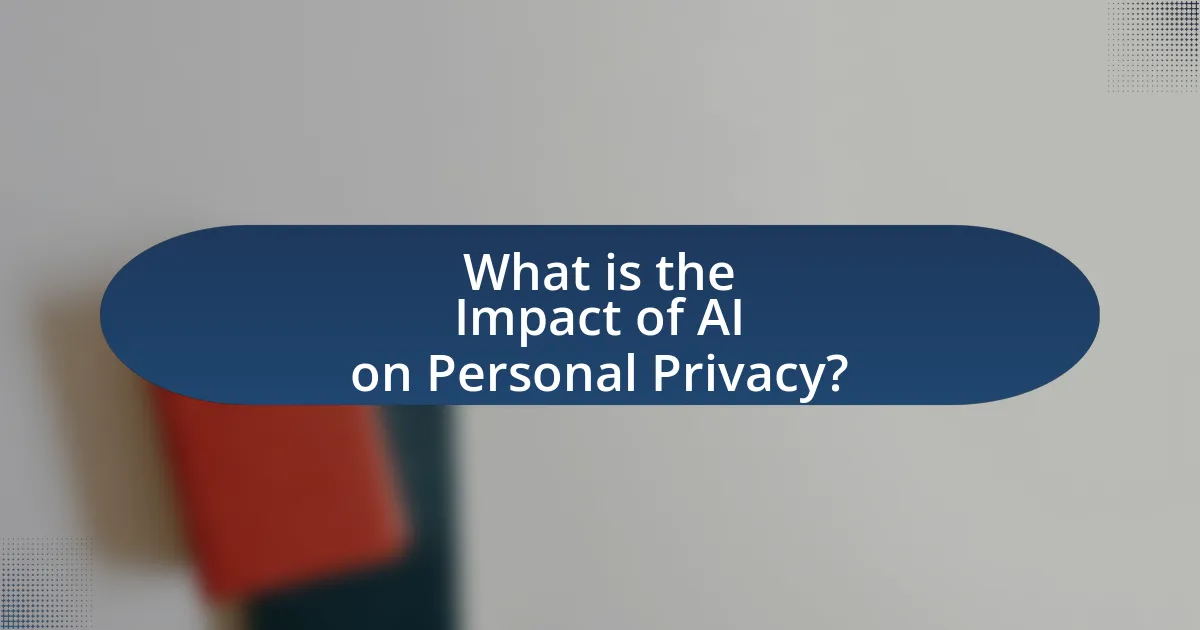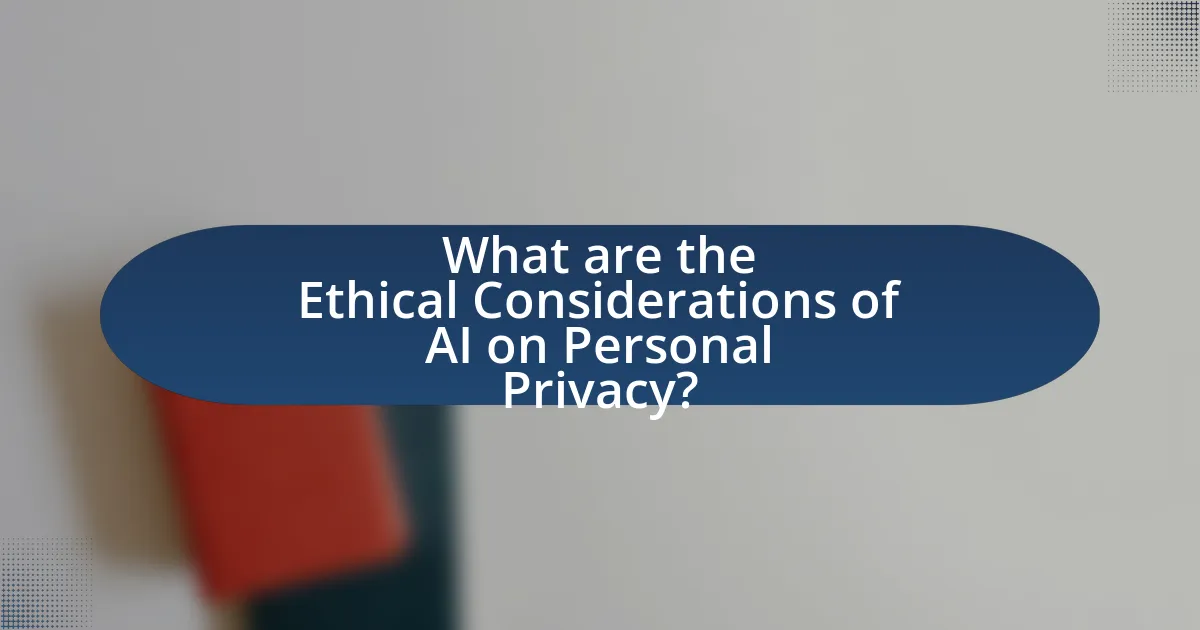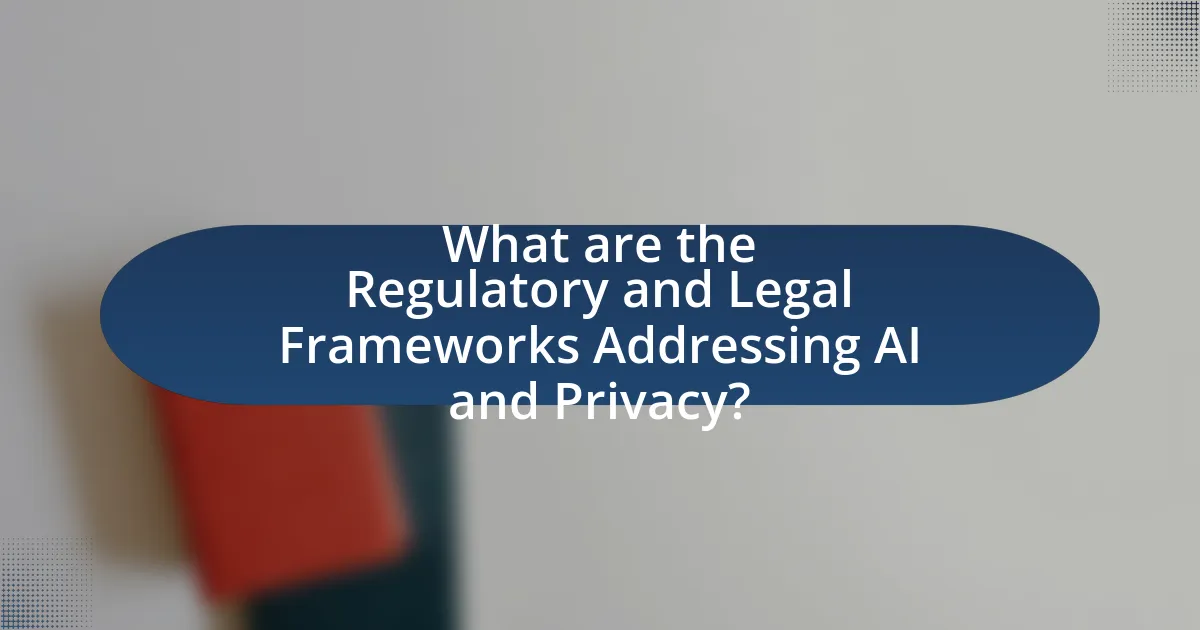The article examines the significant impact of artificial intelligence (AI) on personal privacy, highlighting ethical considerations surrounding data collection, consent, and surveillance. It discusses key AI technologies such as facial recognition and data mining, which pose risks to individual privacy by enabling extensive monitoring and data exploitation. The article also addresses the importance of personal privacy rights, the implications of privacy erosion on individuals and society, and the regulatory frameworks like the General Data Protection Regulation (GDPR) that govern AI practices. Furthermore, it explores the ethical dilemmas faced by various stakeholders, including consumers and businesses, in balancing innovation with privacy protection.

What is the Impact of AI on Personal Privacy?
The impact of AI on personal privacy is significant, as AI technologies often require extensive data collection and analysis, which can lead to privacy violations. For instance, AI systems used in surveillance can track individuals’ movements and behaviors without their consent, raising ethical concerns about autonomy and data ownership. A study by the Electronic Frontier Foundation highlights that AI-driven data aggregation can expose sensitive personal information, increasing the risk of identity theft and unauthorized access. Furthermore, the Cambridge Analytica scandal exemplifies how AI can manipulate personal data for targeted advertising and political influence, demonstrating the potential for misuse. Thus, while AI offers advancements in various fields, it poses serious challenges to maintaining personal privacy.
How does AI technology influence personal privacy?
AI technology significantly influences personal privacy by enabling extensive data collection and analysis, often without explicit consent. This capability allows organizations to track individual behaviors, preferences, and locations through various means, such as surveillance systems and online tracking. For instance, a report by the Electronic Frontier Foundation highlights that AI algorithms can analyze vast amounts of personal data, leading to potential misuse and breaches of privacy. Furthermore, the Cambridge Analytica scandal exemplifies how AI-driven data analytics can exploit personal information for targeted political advertising, raising ethical concerns about consent and data ownership.
What are the key AI technologies affecting personal privacy?
Key AI technologies affecting personal privacy include facial recognition, natural language processing, and data mining algorithms. Facial recognition technology enables the identification of individuals in public spaces, raising concerns about surveillance and consent. Natural language processing allows for the analysis of personal communications, potentially leading to unauthorized data collection and profiling. Data mining algorithms aggregate vast amounts of personal information from various sources, which can be used to infer sensitive details about individuals without their knowledge. These technologies collectively pose significant risks to personal privacy by enabling intrusive monitoring and data exploitation.
How do these technologies collect and use personal data?
Technologies collect and use personal data through various methods such as data mining, tracking, and user interactions. Data mining involves analyzing large datasets to identify patterns and extract valuable insights, while tracking utilizes cookies and other identifiers to monitor user behavior across websites and applications. Additionally, user interactions, such as filling out forms or engaging with services, provide direct data input. For instance, a 2021 study by the Pew Research Center found that 79% of Americans are concerned about how their data is being used by companies, highlighting the widespread awareness of data collection practices.
Why is personal privacy important in the context of AI?
Personal privacy is crucial in the context of AI because it safeguards individual autonomy and prevents misuse of personal data. AI systems often rely on vast amounts of personal information to function effectively, which raises concerns about data security and the potential for surveillance. For instance, a study by the Electronic Frontier Foundation highlights that unauthorized data collection can lead to discrimination and manipulation, undermining trust in technology. Furthermore, the General Data Protection Regulation (GDPR) emphasizes the importance of privacy by granting individuals rights over their personal data, reinforcing the ethical obligation for AI developers to prioritize privacy in their systems.
What are the fundamental rights associated with personal privacy?
The fundamental rights associated with personal privacy include the right to control personal information, the right to confidentiality, and the right to be free from unwarranted surveillance. These rights are enshrined in various legal frameworks, such as the Fourth Amendment of the U.S. Constitution, which protects against unreasonable searches and seizures, and the General Data Protection Regulation (GDPR) in the European Union, which grants individuals rights over their personal data. The recognition of these rights is crucial in the context of AI, as advancements in technology can lead to increased risks of data breaches and unauthorized surveillance, thereby necessitating robust legal protections to uphold individual privacy.
How does the erosion of privacy affect individuals and society?
The erosion of privacy negatively impacts individuals and society by increasing vulnerability to surveillance and data exploitation. Individuals experience heightened anxiety and a sense of powerlessness as their personal information becomes accessible to corporations and governments, leading to a loss of autonomy. For instance, a 2020 study by the Pew Research Center found that 81% of Americans feel that the potential risks of companies collecting their data outweigh the benefits. Societally, this erosion fosters a culture of mistrust, as citizens become wary of their interactions and relationships, ultimately undermining democratic values and social cohesion. The Cambridge Analytica scandal exemplifies how personal data misuse can influence political outcomes, demonstrating the broader implications of privacy erosion on democratic processes.

What are the Ethical Considerations of AI on Personal Privacy?
The ethical considerations of AI on personal privacy include issues of data collection, consent, and surveillance. AI systems often require vast amounts of personal data to function effectively, raising concerns about how this data is collected and used. For instance, a study by the Pew Research Center found that 79% of Americans are concerned about how companies use their data, highlighting the need for transparent data practices. Additionally, the lack of informed consent can lead to ethical dilemmas, as individuals may not fully understand how their data is being utilized. Surveillance technologies powered by AI further complicate privacy issues, as they can enable intrusive monitoring without individuals’ knowledge or consent. These factors underscore the importance of establishing ethical guidelines to protect personal privacy in the age of AI.
What ethical dilemmas arise from AI’s impact on personal privacy?
AI’s impact on personal privacy raises significant ethical dilemmas, primarily concerning consent, data ownership, and surveillance. The use of AI technologies often involves collecting vast amounts of personal data without explicit consent, leading to questions about individuals’ rights to control their information. For instance, a study by the Pew Research Center found that 79% of Americans are concerned about how their data is being used by companies. Additionally, the potential for AI to enable pervasive surveillance creates ethical concerns regarding autonomy and freedom, as individuals may be monitored without their knowledge or consent. These dilemmas highlight the need for robust ethical frameworks to protect personal privacy in the age of AI.
How do consent and autonomy play a role in AI data usage?
Consent and autonomy are critical in AI data usage as they ensure individuals have control over their personal information. Consent involves obtaining explicit permission from users before collecting or processing their data, which aligns with ethical standards and legal frameworks like the General Data Protection Regulation (GDPR). Autonomy empowers individuals to make informed decisions regarding their data, fostering trust in AI systems. Research indicates that 79% of consumers are concerned about how their data is used, highlighting the importance of respecting user autonomy in data practices. By prioritizing consent and autonomy, organizations can enhance transparency and accountability in AI data usage.
What are the implications of surveillance and data ownership?
Surveillance and data ownership have significant implications for personal privacy, autonomy, and societal trust. The pervasive collection of personal data through surveillance technologies can lead to a loss of individual privacy, as individuals may feel constantly monitored, which can inhibit free expression and behavior. Furthermore, data ownership raises questions about who controls and benefits from personal information; when companies or governments own data, individuals often lack agency over their own information, leading to potential exploitation or misuse. Research indicates that 79% of Americans express concern about how their data is used by companies, highlighting a widespread apprehension regarding data ownership and surveillance practices. This concern underscores the need for robust data protection regulations to safeguard individual rights and promote ethical standards in data handling.
How do different stakeholders view the ethical implications?
Different stakeholders view the ethical implications of AI on personal privacy through varied lenses, reflecting their interests and responsibilities. For instance, technology companies often prioritize innovation and market competitiveness, leading them to advocate for flexible regulations that allow for data utilization while emphasizing user consent. In contrast, privacy advocates focus on safeguarding individual rights, arguing for stringent regulations to protect personal data from misuse and ensure transparency in AI systems. Government regulators typically seek a balance, aiming to foster technological advancement while enforcing laws that protect citizens’ privacy. Academic researchers contribute by analyzing the societal impacts of AI, highlighting ethical concerns related to bias and surveillance. These diverse perspectives underscore the complexity of ethical considerations surrounding AI and personal privacy, as each stakeholder’s viewpoint is shaped by their specific roles and objectives in the ecosystem.
What are the perspectives of consumers regarding AI and privacy?
Consumers generally express concern regarding AI and privacy, emphasizing the need for transparency and control over their personal data. A survey conducted by Pew Research Center in 2021 revealed that 81% of Americans feel that the potential risks of data collection by companies outweigh the benefits. Additionally, many consumers are wary of how AI systems utilize their data, with 70% indicating they are more likely to trust companies that clearly explain their data practices. This highlights a significant demand for ethical standards and regulations surrounding AI technologies to protect consumer privacy.
How do businesses balance innovation with ethical responsibilities?
Businesses balance innovation with ethical responsibilities by implementing frameworks that prioritize ethical standards alongside technological advancements. For instance, many companies adopt ethical guidelines that align with industry standards, such as the IEEE Global Initiative on Ethics of Autonomous and Intelligent Systems, which emphasizes transparency, accountability, and fairness in AI development. Additionally, businesses often engage stakeholders, including consumers and ethicists, to assess the societal implications of their innovations, ensuring that new technologies respect personal privacy and do not exacerbate inequalities. This approach is supported by research indicating that organizations that prioritize ethical considerations in innovation tend to foster greater trust and loyalty among consumers, ultimately leading to sustainable business practices.

What are the Regulatory and Legal Frameworks Addressing AI and Privacy?
Regulatory and legal frameworks addressing AI and privacy include the General Data Protection Regulation (GDPR) in the European Union, which mandates strict guidelines on data processing and privacy rights for individuals. GDPR emphasizes transparency, consent, and the right to access personal data, directly impacting how AI systems handle personal information. Additionally, the California Consumer Privacy Act (CCPA) provides similar protections in the United States, granting consumers rights over their personal data and imposing obligations on businesses regarding data collection and usage. These frameworks are designed to ensure that AI technologies operate within legal boundaries while safeguarding individual privacy rights.
What laws govern AI’s impact on personal privacy?
The laws governing AI’s impact on personal privacy primarily include the General Data Protection Regulation (GDPR) in the European Union, the California Consumer Privacy Act (CCPA) in the United States, and various national privacy laws. The GDPR establishes strict guidelines for data processing and emphasizes individuals’ rights over their personal data, including the right to access, rectify, and erase information. The CCPA provides California residents with rights regarding their personal information, including the right to know what data is collected and the right to opt-out of its sale. Additionally, countries like Canada and Australia have their own privacy frameworks that address AI’s implications on personal data. These laws collectively aim to protect individuals’ privacy in the context of AI technologies by regulating data collection, usage, and sharing practices.
How do regulations like GDPR influence AI practices?
Regulations like GDPR significantly influence AI practices by imposing strict guidelines on data collection, processing, and storage. These regulations require AI systems to ensure transparency, obtain explicit consent from users, and implement data protection measures, thereby shaping how organizations develop and deploy AI technologies. For instance, GDPR mandates that individuals have the right to access their data and request its deletion, compelling AI developers to create systems that respect these rights and incorporate privacy by design. This regulatory framework not only enhances user trust but also drives innovation in privacy-preserving AI techniques, such as differential privacy and federated learning, which allow for data analysis without compromising individual privacy.
What are the challenges in enforcing privacy laws in AI?
Enforcing privacy laws in AI faces significant challenges due to the rapid evolution of technology and the complexity of data usage. One major challenge is the difficulty in defining what constitutes personal data in AI systems, as algorithms often process data in ways that obscure individual identities. Additionally, the global nature of AI development complicates enforcement, as different jurisdictions have varying regulations, making compliance difficult for multinational companies. Furthermore, the lack of transparency in AI algorithms hinders accountability, as it is often unclear how data is collected, processed, and utilized. These factors contribute to the ongoing struggle to effectively implement and enforce privacy laws in the context of AI.
How can organizations ensure ethical AI practices regarding personal privacy?
Organizations can ensure ethical AI practices regarding personal privacy by implementing robust data governance frameworks that prioritize transparency, consent, and accountability. These frameworks should include clear policies on data collection, usage, and sharing, ensuring that individuals are informed about how their data will be utilized. For instance, the General Data Protection Regulation (GDPR) mandates that organizations obtain explicit consent from users before processing their personal data, reinforcing the importance of user autonomy and privacy rights. Additionally, organizations should conduct regular audits and impact assessments to evaluate their AI systems for potential biases and privacy risks, thereby fostering a culture of ethical responsibility and compliance with legal standards.
What best practices should organizations adopt to protect personal privacy?
Organizations should adopt data minimization, strong encryption, and regular privacy audits to protect personal privacy. Data minimization involves collecting only the necessary personal information, thereby reducing the risk of exposure. Strong encryption safeguards data both in transit and at rest, making it difficult for unauthorized parties to access sensitive information. Regular privacy audits help organizations identify vulnerabilities and ensure compliance with privacy regulations, such as the General Data Protection Regulation (GDPR), which mandates strict data protection measures. These practices collectively enhance personal privacy and build trust with stakeholders.
How can transparency and accountability be integrated into AI systems?
Transparency and accountability can be integrated into AI systems through the implementation of clear documentation, audit trails, and stakeholder engagement. Clear documentation involves providing accessible information about the algorithms, data sources, and decision-making processes used in AI systems, which allows users to understand how decisions are made. Audit trails ensure that all actions taken by AI systems are recorded, enabling traceability and accountability for outcomes. Stakeholder engagement involves involving diverse groups, including ethicists, users, and affected communities, in the design and evaluation of AI systems to ensure that their perspectives and concerns are addressed. Research by the AI Now Institute highlights the importance of these practices in fostering trust and ethical use of AI technologies.
What steps can individuals take to protect their privacy in an AI-driven world?
Individuals can protect their privacy in an AI-driven world by implementing strong data management practices. This includes regularly reviewing and adjusting privacy settings on social media and online accounts to limit data sharing. Additionally, using encryption tools for communications and data storage can safeguard personal information from unauthorized access. Employing virtual private networks (VPNs) enhances online anonymity by masking IP addresses, while being cautious about sharing personal information online reduces exposure to data collection. Research indicates that 79% of consumers are concerned about how companies use their data, highlighting the importance of proactive privacy measures.





